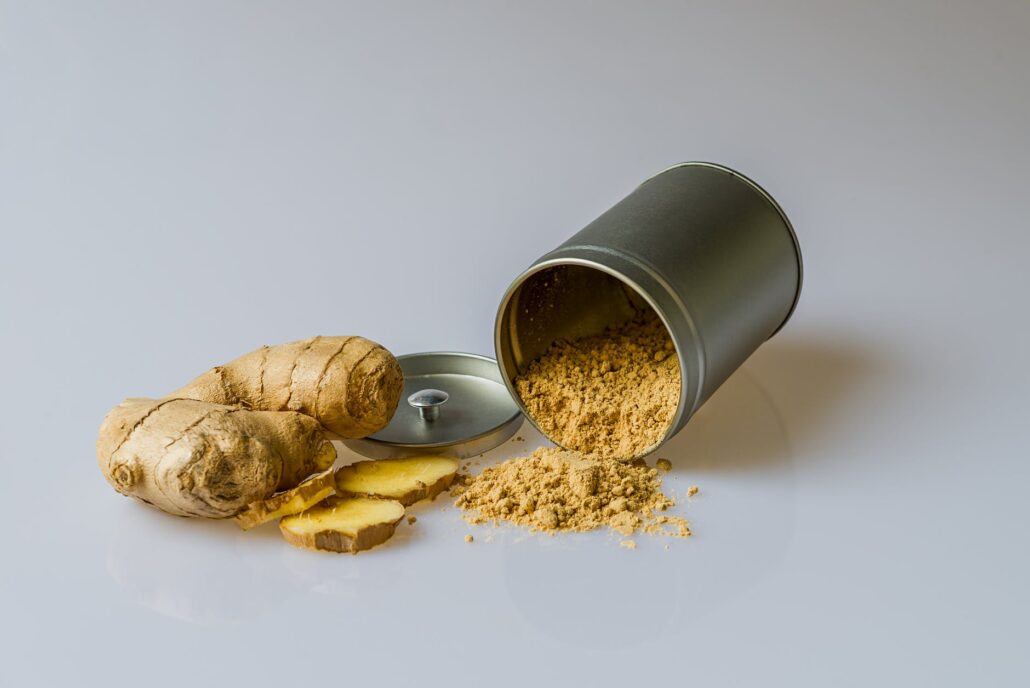Ginger is among the most powerful spices on the planet. Loaded with nutrients and bioactive compounds, ginger can have a positive effect on your mind and body. Ginger root is the active component of the flowering ginger plant responsible for these benefits and is widely used as a alternative medicine, as well as a spice. Not only does ginger add a kick to cuisine, its array of health benefits earn it the label of a “superfood.”
Benefits of Ginger for your Physical and Mental Health
Helps improve skin health
Ginger contains natural oils known as gingerols that reduce inflammation and pain. Anti-inflammatory benefits of gingerols can help soothe irritated skin. One study found that eating a combination of curcumin (the active ingredient in turmeric) and ginger helped improve the skin’s appearance and ability to heal.
Helps cure nausea, bloating and indigestion
If you’re experiencing digestive problems, ginger may be able to help. Ginger has qualities that calm your stomach and help alleviate bloating and gas. Delayed emptying of the stomach also known as gastroparesis is a major driver of indigestion. Ginger is also a research-backed remedy for nausea, including motion sickness, chemotherapy and morning-sickness.
May reduce pain and soreness
Ginger has been shown to be helpful in reducing exercise-induced muscle pain. In one study, consuming 2 grams of ginger per day, for 11 days, significantly reduced exercise-induced muscle pain.
Another use of ginger is to relieve menstrual pain. In one study, women took 1 gram of ginger powder per day, for the first 3 days of their menstrual period and the ginger reduced the pain as effectively as 400mg of ibuprofen.
Lowers blood sugar and risk of heart disease
Ginger can help lower LDL (bad) cholesterol levels, reducing the risk of heart disease. The root’s blood-thinning properties could also help prevent the formation of blood clots, reducing the risk of heart attack and stroke. If you’re already take blood-thinning medications, check with your clinician before including ginger in your diet.
A randomized, double-blind, placebo-controlled, clinical trial of 41 people with type 2 diabetes found that consuming 2 grams of ginger powder per day may reduce the risk of some secondary chronic complications of diabetes. The study participants who ate the daily ginger supplement showed a significant reduction in fasting blood sugar levels.
Helps fight colds
There may not be a cure for the common cold, but ginger may be able to help. Gingerols have antimicrobial and antifungal properties that help fight infections and boost your immune system. Next time you feel a cold coming on, try mixing hot fresh grated ginger into your tea or soup.
May improve brain function
As we’ve seen in the past, oxidative stress and chronic inflammation can have a negative effect on cognitive function and can accelerate the brain’s aging process. These factors are believed to be linked to Alzheimer’s disease and age-related cognitive decline. One study indicates that the antioxidants and bioactive compounds in ginger reduce inflammation that occurs in the brain. There is also evidence that ginger can enhance brain function directly. A 2011 study of 60 healthy middle-aged women showed that ginger may enhance both the attention and cognitive processing.
What to do before incorporating ginger into your diet
Ginger has many benefits to the skin, gut and overall health. Incorporating ginger into your diet may help you on your journey to a healthier lifestyle, but it is only one of many wellness choices.
How to prepare and store ginger
Unlike other foods, ginger has a peculiar look that might be intimidating to some. Don’t let this stop you as it is rather simple to prepare. At the market, choose an unblemished piece with smooth skin. The root should not look dried out. You can store the root unpeeled in the fridge, wrapped in plastic for up to three weeks or in the freezer for 6 months. When it is time to prepare the ginger, remove the skin using a peeler then finely chop before adding to recipes. Ginger is usually associated with Asian cuisine, but its spicy, zesty taste is also found in beverages, baked goods, marinades and on fruit and vegetables. Ginger can be used freshly grated, as a dry powder, as an oil or juice.
Talk to your clinician about ginger
Outside of individuals with allergies, ginger is not harmful and can be consumed in moderation. However, you should always consult with your clinician before adding substantial amounts of ginger to your diet as it can interfere with some medications.
Sources
The following blog references a 2017 womenshealthmag.com article by Marissa Miller.
